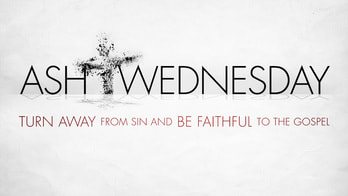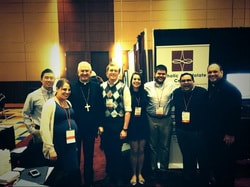|
“God is offering us grace, let us be man enough to accept it!”
- Monsignor Vito Buonanno I heard this a couple weeks ago at a Knights of Columbus meeting and it has stuck with me ever since. Not only are these words empowering and driving us to seek God, but they also perfectly describe our Lenten journey. We are imperfect, we are lacking, we are human, but God still loves us. He is offering us the grace to seek Him, to journey toward him, to be with Him, let us accept this grace, take His hand, and walk with God! This is easier said than done. Last week we celebrated Ash Wednesday and many of us made Lenten promises to abstain from sweets, help out a neighbor, or pray a little bit more. And at the beginning of the Lenten season, many of us are most likely already struggling with our Lenten promise. But we cannot focus on those failures, rather we must focus on how to stand back up and continue walking toward Christ. We need to focus on converting ourselves to Christ. In his Ash Wednesday homily in 2014, Pope Francis said, “Once again Lent comes to make its prophetic appeal, to remind us that it is possible to create something new within ourselves and around us, simply because God is faithful, always faithful, for he cannot deny himself, he continues to be rich in goodness and mercy, and he is always ready to forgive and start afresh.” We have heard similar themes before in Baptism. In Baptism, we talk about beginning anew and starting afresh as we enter into the water, die with Christ, and are reborn in him. Our Lenten journey is a reminder of our Baptismal call to live out the Gospel and in doing so we convert others and ourselves to Christ. The Lenten journey is different for each and every one of us for we all convert ourselves to Christ in different ways. And yet at the center of every conversion has to be prayer. It is only through prayer that we can come to understand all that God is asking of us. It is only through a dialogue with Him that we can form ourselves in His image. It is only through prayer that we are able to examine ourselves, reconcile with Christ, and move forward walking with hope toward the light of salvation. Prayer is not always easy. Oftentimes I sit down to pray and am bombarded with thoughts about everything that I need to do that day, the things in my life that are worrying me, and the distracting sounds around me. Some people would say to find God in those distractions, to let Him speak to you through them, but that does not always work for me. When I am struggling to pray I turn to formed prayer, to writings of Archbishop Fulton Sheen, Pope Francis, or St. Thomas Aquinas. When I am struggling to pray I turn to Our Blessed Mother and pray the rosary. These things ground me in my faith and when I am finished I am ready to listen. This Lenten season lets us open our hearts to Christ so that He may guide us on this journey to Him. Jesus wants to love us, we just have to say yes! Nicholas Shields is a Young Professional in Washington, D.C. To learn more about Lenten prayer please check out our Lenten Resources!
0 Comments
Did you forget to wash your face this morning?
As someone who doesn’t like to draw attention to herself, stares and questions can make Ash Wednesday hard. It is the only day of the year (at least to my knowledge) where people can immediately identify you as Christian on sight. You don’t even have to do anything; it is right there, spelled out in black and white, on your forehead. For the distribution of ashes, the priest has a couple choices, but one option is to remind the people of their call to “turn away from sin and be faithful to the Gospel.” Jesus asks us to feed the hungry, clothe the naked, care for the sick, and to visit the imprisoned (Mt 25:34-46). How can your Lenten sacrifice live out the gospel message? When I was little, I would give up something that I loved for Jesus, like candy or, as in the case of one really difficult Lent, soda. Making any sacrifice, intending to show your love for God, is a great start, but I encourage you to take it one step further. If you decide to sacrifice your morning coffee, maybe money you would have spent at the coffee house could go to a local charity that provides winter coats for the homeless. If you’ve noticed that you being spending a little too much of your Saturday mornings watching television, this Lent might be a wonderful time to volunteer to stock shelves at your local food pantry or to serve meals at the soup kitchen. Maybe you could wake up an hour earlier to take a lonely, elderly neighbor to Mass. This Lent is the perfect time to be a living witness to the gospel, but that witness should continue even after Easter. That does not mean that you should give up coffee for the rest of your life or that you should never spend another Saturday morning watching television, but it does mean that our desire to make sacrifices out of love for Jesus shouldn’t end just because Lent does. This Ash Wednesday, I encourage you to think about not just how you can live the gospel during the next forty days, but how can you make it a part of your daily life. Ash Wednesday should not be the only day where people can immediately tell that you are Christian; your actions should make it crystal clear all throughout the year. There is no greater compliment than for people to be able to tell that you belong to Christ. Wear your ashes as a proud witness to your belief in Christ, answer any questions that come, and you just might inspire someone else to start his or her own faith journey. Jennifer Beckmann is an Administrative Secretary for the United States Conference of Catholic Bishops. For more information, be sure to check out the Catholic Apostolate Center's Lenten Resource Page! We have all been there – mid-morning on Ash Wednesday, awkwardly trying to hide the fact that our stomach is grumbling, wondering what actually constitutes as a “small meal”, and attempting to find it within ourselves to pray when all we can think about is those pangs of hunger. Or the classic Friday in Lent – where every meatless option seems unappetizing, and it is impossible to stop thinking about how badly we want chicken nuggets. Or that Lent when you decided to give up all sweets and you find yourself agonizing over whether or not a frosted donut really counts as a sweet . . . Why is this? Why is it that on days (or seasons for that matter) where we are called to fast or abstain from certain foods or other comforts, we feel conflicted about what the Church is calling us to do? There are any number of contributing factors (including the fact that chicken nuggets and donuts are delicious), but the heart of the matter is this: when we make sacrifices both big and small, we are often focused on what we are doing and forget the sacrifices of Lent are really about what is being done to us.
In her wisdom, the Church gives us Lent to take a step back - to simplify and to ultimately journey towards Christ in His suffering, death, and resurrection. During this season we are more aware of what we are giving up – of the sacrifices that we are making, and those things that we are temporarily missing out on enjoying. It can be all too easy to fall into the trap of grudgingly accepting what we have decided to sacrifice, instead of using it as an opportunity to better ourselves on the journey to Easter. Every time we make the mistake of thinking our own sacrifices about us, we are missing the point of this Lenten journey. The reality of the world that we live in is that sacrifice is underrated – our friends and people around us may not understand why we would willingly give up earthly comforts for a Church season. But we know differently. Every small sacrifice we make is about becoming more aware of the sacrifice that Christ made for us 2000 years ago. Instead of sighing in frustration about what we cannot have every time our stomach growls, we should utter a prayer of gratitude for the chance to conform our lives more to the life of Christ. We have the privilege to journey through these 40 days towards the cross of Good Friday. Although we all have to take up our own small crosses in the form of prayer, fasting, and almsgiving, the most important thing we will do is walk confidently towards the cross of Christ. The beauty of the cross is that it is bigger than any one thing that we can do, and the cross has the power to continually renew us in our mission as baptized Christians. So although we may be temporarily missing our favorite treat or meat on Fridays, we can take hope that our sacrifices are not about how much we can do, they are about making ourselves more ready to celebrate the Easter Sunday that comes after the Good Friday. Lauren Scharmer is a senior at the Catholic University of America studying Social Work & Theology and is active in both retreat and youth ministry in both the Archdiocese of Washington, D.C. and Diocese of Arlington. This past weekend I was fortunate to attend my first Mid-Atlantic Congress for Pastoral Leadership in Baltimore, Maryland with the Catholic Apostolate Center team. It was the first conference of this kind that I had ever attended, and it was a wonderful experience for me. I spent the weekend with several other members of the Catholic Apostolate Center team, and we met so many people and organizations who are doing incredible work. It was great to connect with new people and reconnect with those whom we already work with. At MAC, the Catholic Apostolate Center sponsored several sessions with opportunities for collaboration and conversation among different groups. Being grounded in the spirituality of St. Vincent Pallotti, collaboration is something the Catholic Apostolate Center are especially focused on. In the few days after we returned home, I found myself wondering how the spirit of collaboration that I saw at MAC could also continue with me on my Lenten journey.
As I was sitting at Mass yesterday for Ash Wednesday, I was reflecting on my time this past weekend. I realized that I often think of the Lenten season as a time for personal growth and reflection, a time where I can examine my own faith. And it is true. Lent is a very individual experience. But as I sat in Church yesterday next to a close friend, I realized that Lent doesn’t just have to be an individual journey. People in our lives can provide valuable support and insight, and sharing our journey with others this Lent can expand on our personal growth. Leaving Mass, I had a conversation with a number of people about the fact that Ash Wednesday Mass is so well attended, despite it not being a holy day of obligation. We talked about the sense of unity we feel as we begin the Lenten season together, all marked with our ashes. It is unusual to think of Lent as a time of collaboration, but Ash Wednesday is one of the days where our Catholicism is most outwardly on display. A non-Christian friend calls Ash Wednesday “Spot the Catholics Day,” and it makes me laugh, but also makes me feel proud to display my faith so openly. On Ash Wednesday, we walk around and see others with the marks of ashes on their forehead and feel a sense of solidarity with them, even without knowing them. We have this unspoken bond, and the breath of the Universal Church becomes very apparent. Collaboration is about working with others for a common goal. I believe that Ash Wednesday and the entire Lenten season is a reminder that our own struggles are what unite us as members of the community of faith. During this Lenten season, I would challenge you to share your personal journey with others in your life: share your joys and also your struggles. Lent is a personal time, but the sense of peace we so often find is much better when shared with others in our lives. We are a community of believers, and Lent is a time to reflect and remind ourselves both of our personal commitment to our faith and to remind us of our place within this community. Rebecca Ruesch is the Blog Editor for the Catholic Apostolate Center Mardi Gras, to me, is another example of the type of people we Catholics are—CELEBRATORY! How many other faiths enter into a season of contemplation, penitence and conversion with a party? Tonight, in my own community we will prepare for Lent by eating red meat—an occurrence that rarely happens in our house- drinking the rest of the good wine, and finishing the King Cake that was sent to us from our family down south. Many other Catholics across the country and world will follow suit- clearing their houses of all that they will be fasting from starting tomorrow.
The celebratory people that we are today are not denied tomorrow with the season of Lent. Rather, we recognize and value that to be a people who can rejoice completely and live fully alive we must first be a people of transformation and conversion. Richard Rohr writes, “If we do not transform our pain we will transmit it.” The season of Lent is a season to contemplate the pains in our own lives and transform them, so that in the rising of the Lord at Easter we can truly REJOICE. Tomorrow we put on Ashes from the palms that we waved when we rejoiced in the coming of Christ into Jerusalem last year at Palm Sunday. These Ashes do not show our holiness, rather they outwardly show our recognition that we are a people who need to convert our ways and transform our pains. During Lent we enter into the silence of contemplation to strip ourselves of all things that keep us from pure joy and blind us from recognizing God among us. Thomas Merton, a Trappist Monk and spiritual writer, stated the following about contemplation: “To enter into the realm of contemplation, one must in a certain sense die: but this death is in fact the entrance into a higher life. It is a death for the sake of life, which leaves behind all that we can know or treasure as life, as thought, as experience as joy, as being. [Every form of intuition and experience] die to be born again on a higher level of life.” This is what we celebrate today! We celebrate being a people who wish to enter into the realm of contemplation for the sake of transformation; to enter a realm of difficulty, pain, and struggle in order transform our experiences of joy and life into pure joy and eternal life. As Catholics we enter into the season of Lent by first eating rich foods, drinking merrily, and celebrating the lives that we have been given. This joy of being Catholic is then enriched when we can fast from all that distracts us from pure joy, give alms to those in which Christ resides, and deepen our relationship with our Savior through prayer. Today we start with a party and tomorrow we live the transformation that our hearts desire so that in 40 days and 40 nights we can fully celebrate the risen Lord and rejoice as a celebratory people! Pam Tremblay is the Blog Editor for the Catholic Apostolate Center. January 29th- that means sixteen days until Ash Wednesday, twenty days until the first Sunday of Lent, thirty-four days until Easter Sunday, and it doesn’t end there…. Although it has only been a few weeks from the end of the Christmas season, already my mind jumps to all the feasts and celebrations that we quickly find ourselves in. This might be due to the quick race into the Lenten season this year, but I think that it has more to do with my need to plan. I confess that I am a chronic planner. My room is covered in post it notes, I have multiple color-coded calendars for the different aspects of my life, and I find nothing more satisfying than crossing something off a to-do list. Although this is the reason that I am able to balance everything in my life, it is also the reason I tend to dread stillness and quiet. I can’t plan out stillness, I can’t know when it is going to end, and it usually doesn’t end in me being able to cross something off a list. Yet, it seems as though within silence I am overwhelmed by the presence of God that is made manifest in the solitude.
Although I tried to address the problem on my own, when I brought it up to a good friend of mine he stared at me for a moment then stated simply, “So you have finally decided to start listening to some of our saints?” His wise remark rung true in my heart. I avoid the silence, I avoid the solitude, I avoid listening to the wisdom of those who have gone before me. Many lips and pens of our Catholic spiritual masters speak and write about this realization of silence. St. Francis de Sales writes, “Never be in a hurry, do everything quietly and in a calm spirit. Do not lose your inner peace for anything whatsoever, even if your whole world seems upset.” Mother Teresa says “we need silence to be alone with God, to speak to him, to listen to him, to ponder his words deep in our hearts. We need to be alone with God in silence to be renewed and transformed. Silence gives us a new outlook on life. In it we are filled with the energy of God himself that makes us do all things with joy.” St Theresa of Lisieux states that if you “settle yourself in solitude…you will come upon Him in yourself.” While the cold wind howls and the silent darkness comes upon us mid-afternoon, let us take these last few weeks of winter to enter into the stillness. Let us know the wisdom of St. Francis de Sales and not be in a hurry for spring. Let us echo in our hearts the words from Mother Teresa reminding us that in silence we are renewed and transformed through the energy of God. And let us find in silence God residing within ourselves. In the words of the psalmist, “Be still and know that I am God (Ps 46:10)” Pam Tremblay is the Blog Editor for the Catholic Apostolate Center. The night before I travel - whether by car, air or sea - I can’t help but begin to feel anxious and get a little overwhelmed about my upcoming journey. No matter how prepared I think I am or how necessary the trip is, I loathe the process of travelling. I’ve never had a ‘bad’ experience, but it isn’t something on my list of things to do every day either. While I’m sure I’m not alone in my sentiment, and there are probably 101 diagnoses as to why I don’t like travelling, I think it boils down to the fact that transition, no matter the circumstances, causes an upheaval of routine.
Throughout our lives, each of us has experienced the anxieties of transition in one way or another: graduating from school and starting a new job; getting married and having children; getting sick or losing a loved one. Every stage of our lives carries with it transition and to some extent, a change in routine. The Book of Ecclesiastes acknowledges this idea in a very poetic way: “There is an appointed time for everything, and a time for every affair under the heavens” (Eccl 3:1). The start of Ordinary Time is no different. While most of us would consider this transition as minimal, the truth is our ‘routine of solemnity’ has come to somewhat of a standstill for the next month. The Solemnity of the Presentation of the Lord (on February 2), and the memorial of Our Lady of Lourdes (on February 11) are among the highlights, but for the non-daily Mass crowd, they will be passed over with little thought. So, the question then becomes, what are we to make of these next few weeks? With less than a month before we begin our celebration of Lent with Ash Wednesday, many of us are tempted to ask what good these next four weeks of green - of Ordinary Time - truly serve? In fact, we might be tempted to brush them aside and regard them as a welcomed break in our otherwise hectic liturgical year. I would suggest, however, that looking at these next four ordinary weeks is essential to our spiritual well-being. Our Catholic faith has a rich history of using the ordinary to reveal the extraordinary. Our sacramental life is centered around the idea that ordinary elements - bread, wine, water, oil, gestures and even people - through the grace of God, constantly reveal extraordinary truths. Even in our secular day to day interactions, we believe that God reveals himself to us through the kind word or action of an ordinary passerby; oftentimes to our amazement. Both the Old and New Testaments tell countless stories of God using ordinary people to bring about His extraordinary plan of salvation: Abraham, Moses, David, Elijah, Elisha, Daniel, Jonah, John the Baptist, Peter and Paul, just to name a few. The lives of the saints and martyrs are no exception. Ss. Francis, Therese of Lisieux, Jerome, Vincent Pallotti, Elizabeth Ann Seton, Francis de Sales, among thousands of others, beautifully exemplify living ordinary lives for the sake of an extraordinary message. Knowing and understanding how God uses the ordinary should be a great source of hope for each of us. It is an invitation for each of us to strip away what we think we need to be and come as we are; in other words, for us to recognize the beauty of our own imperfect humanity. It is through our participation in the ordinary that we enter into a deeper, more honest and fruitful relationship with God, who is perfection. It’s true that this liturgical season, this transition, might bring about some uneasiness or anxiety because it is a break from our recent pomp and solemnity. For some, it might be a minimal, casual transition. And still for others, it might be off their radar completely. Whatever the case, I would suggest making these next four weeks truly ordinary. If we come as we are - as ordinary people - not just to reacclimate ourselves to a different routine, but to enter into an honest dialogue with God, I am confident He will use us in extraordinary ways. This kind of unique and authentic vulnerability is what we are called to, and why we were created. Why not take a little time to participate in it and enjoy it? On January 24th, we will celebrate the memorial of St. Francis de Sales. In his book, The Introduction to the Devout Life, he writes, “When God the Creator made all things, he commanded the plants to bring forth fruit each according to its own kind; he has likewise commanded Christians, who are the living plants of his Church, to bring forth the fruits of devotion, each one in accord with his character, his station and his calling… Therefore, in whatever situations we happen to be, we can and we must aspire to the life of perfection” (Pars 1, cap.3). As we begin this short period of Ordinary Time, we are reminded not of what we lack, but of why being ordinary is so necessary to bring about the extraordinary. We are reminded that each of us have been created as is, to bring about a life of devotion, not for our sake, but for the glory of God. In essence, we are reminded why the green of the thorn, eventually blooms into the white of the rose. Happy Ordinary Time! Jonathan Jerome is the Director of Catholic Campus Ministry at the University of Pittsburgh Johnstown. |
Details
Archives
April 2024
Categories
All
|
About |
Media |
© COPYRIGHT 2024 | ALL RIGHTS RESERVED








 RSS Feed
RSS Feed